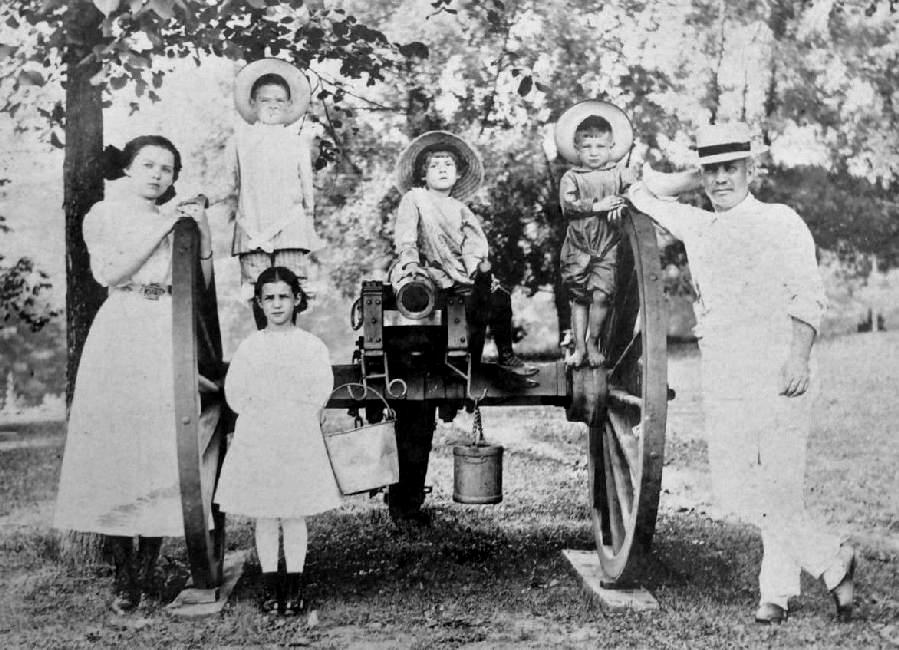
World War I: American Isolationism

Figure 1.--The Civil War had a deep impression on America. In mny ways it created the American nation. It also schooled Americans thoroughly on the evils of War. This combined with the anti-military and pcifisdt sentiment of the mny European immigrants which flocked to America after the War only strengthened the well-established isolationist sentiment of most Americans. Here an American family before World War I is enjoying an outing in a local park. Courthouse squares and parks throughout America were decorated with Civil War cannons. This was in part becuse the Civil War was such an epic experience. It was also becuse the United States had no engaged in a major war since the Civil War and did not have a lot of more modern weapons to put on display.
|
|
Isolationism had deep roots in America. President Washington wisely argued that America should pursue its domestic life
without foreign entanglements. In the same year the United States Constitution was ratified, the French Revolution broke out (1789). Soon major wars enveloped Europe. Americans were divided. Some wanted to support France which had aided American in its Revolution. Other were horrified with the violence and terror of the Revolution and were sympathetic with the British. Despite the strong pressure to enter the European Wars associated with Revolutionary France, both President Adams and President Jefferson pursued policies to keep out the European Wars. President Madison succumbed to political pressure and asked Congress to declare war against Britain (1812). After the War of 1812, isolationism became an axiom of American foreign policy. America issued the Monroe Doctrine to place the Americas off limit to European colonialism. America at the time was a minor power with a very small army and the absence of an industrial base giving it the capability to project power. Another centerpiece of American governance was a bare-bones approach to the military. The United States had a very small army, backed by poorly trained and armed state militias. This was one attraction for European emigrants, escaping conscription and military service as the European arms race began to gather force. There was also a strong pacifist element among many of the new immigrants. The Civil War had taught many Americans about the evils of war. The power calculation had significantly changed by the turn-of the-20th century. The United States still had a tiny professional army, but America since the Civil War had undergone a remarkable metamorphosis. The country had developed from a largely rural, agricultural country to world's largest and most advanced industrial power. The country had built a modern navy, but had not entered the European arms race and had virtually no army. The United States was the world's only industrial power without a large, well armed military. Several small European countries had larger armies better armed armies than the United States. The British recognized the potential importance of the United States. The German's, however, attached much less importance to the potential of American power and were more swayed by America's lack of a large, well equipped army. Some Germans were even more dismissive, thinking that America was not a real nation because it lacked a core racial identity. America had changed economically. Industrialization brought with a range of social changes. What had not changed was a virtually religious commitment to isolationism and a desire to stay out of European wars. There was no realization in America that the era of inconsequentially, but bloody dynastic wars was over. And the possible domination of Europe by Germany had very real security consequences for the United States. Competent diplomacy on the part of Germany could have played on the strength of American isolationist feeling to keep America out of the War. In stead Germany engaged in both reckless military actions and diplomacy that would for the first time overcome American isolationist sentiment.
CIH

Navigate the CIH World War I Pages:
[Return to Main U.S. World War I page]
[Return to Main World War II Isoationism page ]
[Aftermath]
[Alliances]
[Animals]
[Armistace]
[Biographies]
[Causes]
[Campaigns]
[Casualties]
[Children]
[Countries]
[Declaration of war]
[Deciding factors]
-------[Diplomacy]
[Economics]
-------[Geo-political crisis]
[Home front]
[Intelligence]
[Military forces]
[Neutrality]
[Pacifism]
[People]
[Peace treaties]
[Propaganda]
[POWs]
[Russian Revolution]
[Terrorism]
[Trench warfare]
------[Technology]
[Weaponry]
[Bibliographies]
[Contributions]
[FAQs]
[Images]
[Links]
[Registration]
[Tools]
[Return to Main World War I page]
[Return to Main war essay page]
[Return to CIH Home page]
Created: 4:32 AM 12/7/2014
Spell checked: 5:40 AM 12/7/2014
Last updated: 5:40 AM 12/7/2014



